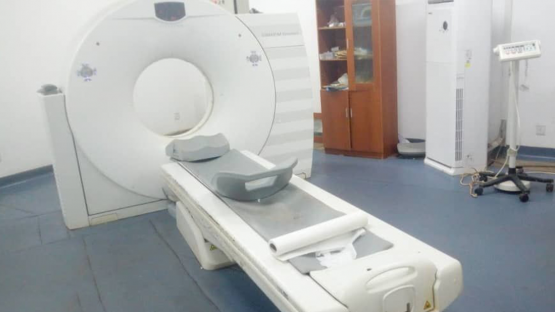Health authorities in Mali have been working to address the country’s growing cancer burden, but despite the strong commitment of the government to fighting the various forms of this non-communicable disease, considerable difficulties remain for cancer patients in accessing diagnosis and treatment. Experts who, at the request of the government, recently assessed Mali’s cancer control capacities as part of an “imPACT Review” proposed workable solutions to strengthen the country’s ability to provide cancer services to those in need.
Experts Assess Mali’s Cancer Control Capacities
A medical imaging device at Mali Hospital, which was part of the equipment reviewed by experts (Photo: Mali Ministry of Public Health and Hygiene).
Evidence-based recommendations
One key area discussed during the Review was how to strengthen the country’s cancer registry, which collects the data of all new cancer cases, and is normally the starting point for the development of a national cancer care strategy. imPACT Review experts found that the cancer registry of Mali would benefit from dedicated funding to procure equipment necessary to sustain data collection and to adequately train staff to maintain the registry.
The most common cancers in Mali are breast, cervical and stomach. Prevention, early detection and proper treatment can reduce incidence and mortality from these cancers. To specifically address the burden of cervical cancer, which can be prevented through vaccination for the human papillomavirus (HPV), discussions during the imPACT Review centred around the scaling up of the vaccination for all girls aged 9 to 12.
The socioeconomic context of Mali represents a major challenge for the country in its fight against cancer. Poverty persists in many areas of the country, particularly in the countryside, and access to healthcare is limited. In 2019, the Government of Mali took a step toward addressing these disparities by creating its strategy for non-communicable diseases (NCDs) for 2019-2023. Cancer is one of the six NCDs considered as a priority in this plan alongside cardiovascular diseases, chronic respiratory disease, diabetes, sickle cell anemia and mental illness. The imPACT Review enabled real-time technical discussions about the NCD strategy between local officials and a team of international experts who were nominated by the IAEA, World Health Organization (WHO) and the International Agency for Research on Cancer (IARC).
Recommendations from the imPACT Review will help the country develop a national plan dedicated to the fight against cancer, said Fanta Siby, Minister of Health and Social Affairs. “This plan will be essential to assess and strengthen our efforts and mobilize the technical and financial partners we need to meet the major challenge of cancer,” she said.

As part of the imPACT Review, independent cancer experts conduct a virtual assessment of the radiotherapy facility at the Mali Hospital in Bamako in collaboration with national medical staff. (Photo: Mali Ministry of Public Health and Hygiene)
Cancer services for all
Several IAEA technical cooperation projects over the last ten years have helped to improve the capacities of Mali’s major hospitals to provide safe and quality cancer diagnosis and treatment. However, additional human and financial resources are still needed to keep existing equipment operational, buy new machines and train staff to extend treatment capacities, said Oscar Meless, the IAEA programme officer responsible for Mali.
“Technical cooperation support to Mali is now at a crossroads, as greater national investment is needed,” Meless said. “The imPACT Review report and its findings will serve as the main reference for the development of new technical cooperation projects.”
Cancer treatment is available in three of Mali’s public hospitals – Mali Hospital, Gabriel Touré, Point G, and one private hospital. Most of these hospitals have surgical oncology capabilities and chemotherapy units, but only Mali Hospital has a radiotherapy department. imPACT review experts recommended setting up a maintenance programme at the radiotherapy department of the Mali Hospital to ensure its sustainable operation.
“The World Health Organization has a long history of engagement with the authorities in Mali to strengthen the health system and in particular the management of non-communicable diseases,” said Jean-Marie Dangou, Public Health Leader Coordinator for NCD Management at the WHO Regional Office for Africa. “Following this Review, we have an updated overview of the cancer control situation in Mali and a comprehensive set of recommendations for improving the government’s interventions, honing into specific needs in both cervical and childhood cancers. Now we need to maintain our momentum and start the planning and costing of the new action plan for cancer control.”
The IAEA, WHO and IARC are already discussing with the national authorities the preparation of a prioritized, costed action plan for cancer and will continue to provide technical and expert support in cancer control to advance the implementation of recommendations from the imPACT Review upon request.
“The imPACT Review provided the Government of Mali with a baseline situation analysis and set of recommendations to guide their cancer control planning and investments. The focus of this Review on cervical cancer is a direct contribution to the WHO global strategy to accelerate the elimination of cervical cancer as a public health problem. The IAEA and its partners look forward to continuing to support Mali within their respective mandates in the fight against cancer,” said Lisa Stevens, Director of the IAEA Programme of Action for Cancer Therapy (PACT).





